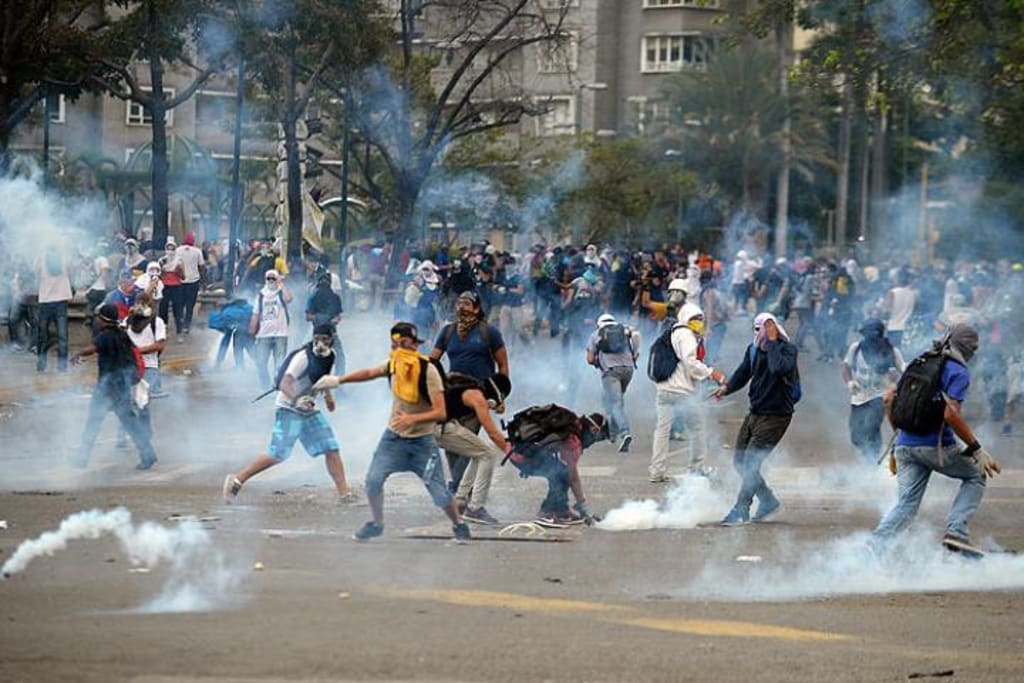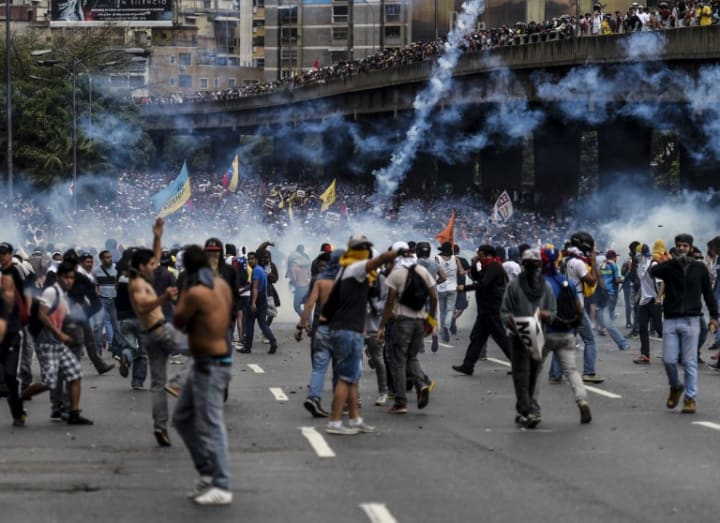Protests in Venezuala
The Rise Against the Goverment

From February 12th, 2014, protests against the government have been nearly constant in the streets of the Venezuelan capital, Caracas. Recently, they're kicking off once again in 2017.
These protesters are marching down the streets of Caracas demanding new elections and for Nicolas Maduro to step down from the presidential office. The protesters accuse the President of 'laying the grounds for a dictatorship'. Both demonstrators and opposition leaders are angry at the government, who, according to them, no longer uphold democratic values and the constitution. All while the President and the party in power accuse the opposition leaders of inciting terrorism and coups against the government.
What Caused These Protests?
The most recent protests initially exploded, on April 1st, after the Venualzlan Supreme Court decided to remove the 'last vestiges of power' from congress - a decision, however, that was later overturned. Obviously not an April Fools joke.
Venuzaula as a country relied on (and still does) oil, very heavily to bring money into the economy. However, with the recent drop in oil prices and no backup fund like other oil dependent countries - such as Saudi Arabia - the country has faced a huge rise in the price of goods as they heavily relied on import rather than their own potential agriculture, and the largest rate of inflation seen in the modern world. This led to a starvation of the poorer population who struggled to buy the food necessary to survive as well as basic goods becoming nearly off limits to them. As well as food price increase, there has been closures of services that usually the left-wing would support. There have been reports that government offices are only open 1-2 days a week to save electricity.
The protests were originally started by students, angry at the lack of security in their community, the anger exploded into the demonstrations, in February, after the alleged attempted rape of a girl.
However, it has to be pointed out that both the lack of security and food shortages affect separate areas of Venualza differently.
The Protests Themselves
In many cities, not just the capital Caracas, demonstrators have clashed with security forces. The president called a state-of-emergency, in January 2016 to fend off calls for his removal. At the same time, a number of opposition leaders have been arrested for 'inciting violence' in which have led to the people of Venezuela calling Maduro a dictator.
Many of those opposition leaders arrested have been barred from running for office by the courts, leading many to question whether the 'president' is twisting the course of democracy, some of the leaders that have been barred from running include main opposition leaders that came close to beating Nicolas Maduro in the original election.
Protests have quickly turned violent with both police and demonstrators using unneeded violence and brutality. A 19-year student was recently shot during clashes between the protestors and the riot police, adding to the death toll - another student was shot and killed the week before. Images recently flooded the internet of an infant having to be evacuated out of a Venezuelan hospital after tear gas ended up in the building.
Since the riots/protest broke out in 2014, on and off and varying in scale, there has been at least 68 deaths, 6831 arrests (not counting the huge amount of arrests that have taken place this year) and somewhere between 2000+ and 6000+ injuries on both state and protestors sides.
With protests once again escalating, the future is almost uncertain and from the stubbornness of the Venezuelan President, the people of Venezuela may have to wait till the 2018 elections to vote for a new president. Until then, however, there is going to be a huge amount of violence and the death toll of this crisis is going to increase.

This week the police attempted to block the major roads in Caracas to stop the protests from disrupting the major city areas. This led to clashes between the protestors and riot police. Rocks and petrol bombs were thrown at the state police and rubbish was set on fire by protestors. The police responded with tear gas and bean bags fired out of shotguns - reports of rubber bullets have being used have emerged as well - images have also emerged of police using riot water guns (like handheld water cannons) in an attempt to subdue protesters.
About the Creator
Cameron Puckey
Amateur Writer and Philosopher, travelling the world with my voice, mind and laptop.






Comments
There are no comments for this story
Be the first to respond and start the conversation.